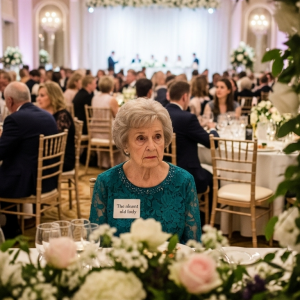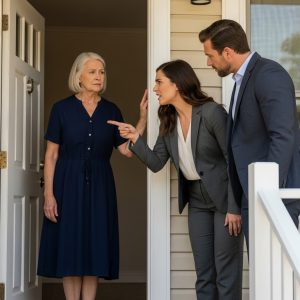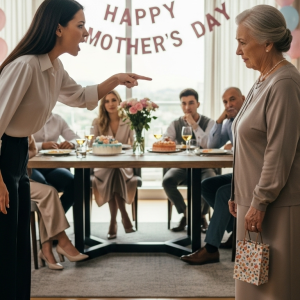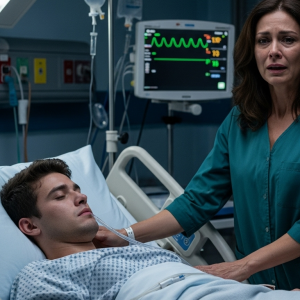The moment I paid off my house, the culmination of forty years of relentless work, my daughter-in-law, Sheena, declared it “family property.” My son, Marcus, stood beside her, a silent, complicit shadow.
“We’re moving in,” Sheena announced, her voice sickly sweet as she placed her oversized handbag on my granite countertop. “The boys need the space, and frankly, it’s a waste for you to be here all alone in such a big place.”
Marcus nodded, his gaze avoiding mine, fixed on a non-existent scuff mark on the floor. “You always said this house was for the family, Mom,” he mumbled.
I felt a chill that had nothing to do with the cool tile beneath my feet and everything to do with the audacity of their words. “I said this house was for family to gather,” I corrected, my voice dangerously even. “For dinners. For birthdays. Not for a hostile takeover.”
Sheena chuckled, a grating sound that set my teeth on edge. “Oh, don’t be so dramatic. We’re not strangers; we’re your family. Besides, we’ve already terminated our lease.”
I didn’t reply. My silence, I’d later realize, was mistaken for permission. A few days later, the boxes began appearing on my porch. At first, I thought it was a mistake, a misdirected delivery. But then I saw Sheena’s handwriting, her sharp, loopy script on a box labeled “Tommy’s Winter Clothes.”
There was no call, no knock. They were simply depositing their lives on my doorstep as if I were a storage unit. The anger simmered. This wasn’t a misunderstanding; it was a calculated invasion.
That afternoon, I found my son wrestling their loveseat through the back door. He didn’t even look at me. “We figured it made sense to bring a few things over early,” he said, breathing heavily. “Just to make the move easier on the boys.”
They had moved my favorite armchair—the one my husband, Reed, had bought for me on our last anniversary—into the corner of the sunroom to make space for their furniture. My home, my sanctuary, was being reconfigured before my eyes by people who saw my kindness as a given.
That night, I sat alone in the dining room, the silence of the house now feeling heavy with their presence. I stared at the paperwork I kept in the bottom drawer of my filing cabinet—the deeds, the receipts, the documents no one else had ever touched.
This house was more than just brick and mortar. It was a promise I’d made to myself decades ago, a promise of stability and peace I’d never had growing up. Reed and I had sketched the first plans on napkins in our cramped duplex, dreaming of windows that caught the morning sun and a garden where we could plant azaleas.
He passed before we broke ground, but I carried on. I learned to hang drywall from a neighbor, bartered landscaping work for leftover materials, and planted every flowerbed with my own two hands. Every lavender bush by the porch, every daffodil under the windows, was a testament to my resilience.
Now, my son and daughter-in-law, who had never once offered to mow the lawn or fix a loose hinge, dared to walk in and call it theirs. My generosity over the years—the bailouts, the babysitting, the loans never repaid—had been twisted into an expectation. They had hollowed out the meaning of “family” and stuffed it with entitlement.
A few days later, I gave them my ultimatum. I presented them with a copy of the deed, my name as the sole owner, and told them calmly but firmly that they needed to make other arrangements.
Sheena cried. Marcus looked betrayed. “I can’t believe you’d do this to us,” he said, his voice thick with a resentment he felt entitled to. They left in a storm of tense silence, leaving their boxes and furniture behind like silent occupiers in my home.
The next morning, I woke to a scene of devastation. My garden, my pride and joy, had been destroyed. The rose bushes I had nurtured for years were ripped from the soil. My climbing trellis was a collapsed wreck of splinters. Potting soil was kicked everywhere, and the ceramic planters Reed had made for me were smashed.
I stood there amidst the wreckage, not crying, not screaming. There was just a cold, hollow space inside me where the grief had been. They weren’t just trying to take my house; they were trying to break my spirit. They knew what that garden meant to me. This wasn’t a tantrum; it was a targeted attack.
But they had underestimated me. They had forgotten that two years prior, after a neighbor’s shed was broken into, I had installed security cameras.
I sat at my computer, my hand steady as I cued up the footage. And there it was. The bobbing beams of flashlights across my lawn. My son’s muffled voice. “Are you sure about this, Sheena?” And then her voice, sharp as a shard of glass. “Stop being so weak. She needs to learn her lesson.”
I watched as they decimated my garden, every malicious act captured in the eerie green glow of the infrared. I watched my daughter-in-law kick over my herb planter with a triumphant laugh. The pain in my chest hardened into a cold, steel resolve.
I saved the footage to three flash drives. One for my lawyer. One for the sheriff. And one—one I would deliver myself. I made twelve copies of the revised deed and its accompanying legal documents. Their game was over.
They came for dinner on Sunday, bearing a store-bought strawberry shortcake as a pathetic peace offering. Sheena’s parents were with them, invited to present a united front, to pressure me. They acted as if nothing had happened, making small talk about the weather and their homeowners’ association complaints.
I let them play out their charade. I served the roast, passed the potatoes, and smiled a smile that never reached my eyes. I let their smug confidence fill my dining room one last time.
Then, after the dessert plates were cleared, I stood up. I didn’t raise my voice. I didn’t make accusations. I simply slid a manila envelope across the table to Sheena.
“What’s this?” she asked, her smile faltering slightly.
“That is a copy of the revised deed to this property,” I said, my voice clear and ringing in the sudden silence. “It was filed five months after my husband passed away. It specifies sole ownership, with no survivorship rights for children or their spouses.”
I watched the color drain from her face. Marcus stared intently at his plate. Sheena’s father cleared his throat.
“And this,” I said, placing a small flash drive next to the envelope, “is the security footage from Thursday night. I believe the sheriff will find it very interesting. As will our church board. And Mrs. Myrtle from the PTA, she always did love a good story.”
The silence shattered. Sheena opened her mouth, but no words came out. Marcus finally looked up, his eyes wide with dawning horror as he realized what I had done. He wasn’t looking at me, but at his wife, and in that moment, I saw the shift. The spell she held over him was broken.
They left without another word. Sheena’s parents scurried out the door, avoiding my gaze. Marcus and Sheena moved in a daze, their boxes and furniture left behind like relics of a war they had spectacularly lost.
The next morning, I called a removal service and had every item they’d left donated to charity. I wrote a check for $800 and mailed it to Sheena’s parents’ address with a simple note: “For a new beginning.” It wasn’t an act of mercy, but of closure. I wanted to owe them nothing, not even my pity.
Then, I walked out into my ruined garden. I put on my gloves, picked up the shattered pieces of the ceramic pots, and began the slow work of turning over the soil. It would take a long time to heal. Some things would never grow back, but others would.
A neighbor helped me build a new fence—a proper one, sturdy and tall. Another brought over clippings from their prize-winning azalea bush. Slowly, my garden began to come back to life, different, scarred, but mine.
I no longer catered to family. I cultivated a community instead. And in the quiet of my home, between the walls I built and the garden I was resurrecting, I found a deeper kind of peace—one that came not from giving in, but from knowing exactly who you are and what you have built.
In the weeks that followed, the house settled into a new kind of quiet. It wasn’t the lonely silence of an empty home, but the peaceful hum of a reclaimed sanctuary. The phantom weight of their presence lifted, and I could breathe again. The air itself felt lighter, cleansed of entitlement and deceit. I took to brewing my morning coffee and walking through the recovering garden, my bare feet on the cool grass, feeling the solid earth beneath me. It was a ritual of grounding, a daily reminder that I was the foundation of this place.
The legal proceedings moved forward with an impersonal but satisfying momentum. Sheriff Miller called to inform me that, faced with the video evidence, both Marcus and Sheena had pleaded no contest to misdemeanor charges of vandalism and trespassing. They were issued a restraining order, a fine they would struggle to pay, and a sentence of community service. There was no trial, no public drama. Their downfall was as quiet and pathetic as their failed invasion.
My community, however, was not so quiet. Pastor Eden approached me after service one Sunday, his face etched with genuine remorse. “I am so sorry,” he said, his voice low. “I saw a family in conflict, but I did not see the truth of the situation. Your strength is a lesson to us all.” It was an unexpected comfort, a validation that I had not been invisible.
Mrs. Myrtle, true to form, provided a more detailed report over a pot of her famous chicken noodle soup, which she delivered to my door. “Sheena’s parents are mortified,” she whispered conspiratorially, though no one else was around. “They’ve taken down all their family photos. And Marcus… well, the word is he’s been sleeping on their sofa. The tension is so thick you could carve it with a knife.” I simply nodded, offering her a slice of lemon cake. I had no interest in reveling in their misery, but hearing the consequences laid bare was like lancing a wound. It was necessary for the healing to begin.
The story that trickled back to me through the town’s grapevine painted a bleak picture for Marcus and Sheena. Their united front had crumbled the moment real adversity struck. Sheena, stripped of her leverage and exposed as a manipulator, had turned her fury on Marcus, calling him weak, a failure, a spineless disappointment who couldn’t even secure his own inheritance.
Marcus, in turn, finally saw the woman he had married not as strong-willed, but as cruel and insatiably greedy. The love he thought they had was merely a partnership of convenience, and he had been the junior partner, disposable the moment he ceased to be useful. The fight, I was told, had been spectacular and final. He packed a single bag and left his in-laws’ home without looking back.
Sheena attempted to control the narrative, painting me as a vindictive crone who had cast out her only son. But the story was no longer hers to tell. The video evidence was a truth too stark to be spun. The community service sentence saw her picking up trash along the highway, her designer handbag replaced with a bright orange vest and a garbage bag. The humiliation was a public spectacle of her own making.
I felt a pang, not of pity, but of a deep, aching sadness for the son I had raised. I mourned the boy who had once held my hand while we planted daffodil bulbs, the young man who had promised to always look after me. That version of Marcus was gone, lost somewhere in the shadow of the man he had become. I had to accept that, and in acceptance, I found another layer of peace.
Three months passed. The autumn air grew crisp, and the leaves on my maple tree turned a brilliant shade of crimson. I had found a rhythm to my days, one filled with gardening, book club meetings, and long walks by the river. The house felt entirely my own again, every corner infused with my own peace.
Then, one rainy Tuesday afternoon, there was a knock on the door. It wasn’t the hesitant tap of a delivery driver or the cheerful rap of a neighbor. It was a soft, uncertain sound, almost like a question. I looked through the peephole and my heart stopped.
It was Marcus. Alone.
He was a shadow of himself. He was thinner, with dark circles under his eyes that spoke of sleepless nights. His usual confident posture was gone, replaced by a defeated slump. He just stood there in the rain, not looking at the door, but at the new rose bushes I had just planted.
I took a deep breath, my hand resting on the new deadbolt I had installed. The woman I was before would have thrown the door open. The woman I was now opened it only a few inches, leaving the security chain latched. The cool metal was a comforting line between my world and his.
“Marcus,” I said. It was not a question, but a statement of fact.
He finally looked at me, and I saw the full depth of his shame in his eyes. “Mom,” he whispered, his voice cracking. “Can… can we talk? Please. Not inside. Just here. I won’t ask to come in.”
I stayed behind the door, protected by the chain and the boundaries I had fought so hard to build. The rain dripped from the eaves, a steady rhythm marking the heavy silence between us.
“Why are you here, Marcus?” I asked, my voice devoid of warmth but also of anger. It was simply tired.
He flinched, as if the neutral tone was colder than any rage would have been. “I needed to… I needed to see you. To say… God, I don’t even know where to start.” He ran a hand through his damp hair. “She’s gone, Mom. I left her. I should have done it years ago.”
I remained silent, letting him fill the space. This was his confession, not my interrogation.
“I was a coward,” he said, the words rushing out now. “I let her convince me that taking from you was our right. I stood by while she disrespected you in your own home. The home Dad dreamed of, the home you built. When I saw that video… what we did to the garden… it was like seeing myself for the first time. And I was disgusting.”
Tears streamed down his face, mixing with the rain. “I’m not here for money. I’m not here to ask you for anything. I just wanted to tell you that I’m working two jobs now. I’m going to pay you back for every bit of damage. And I started seeing a therapist. To figure out why… why I let myself become someone my father would be ashamed of.”
He looked at me then, his gaze direct and pleading for the first time. “I don’t expect you to forgive me. I don’t deserve it. But I hope, one day, I can earn back the right to even speak to you.”
I looked at my son, truly looked at him, and saw not the entitled man who had betrayed me, but a broken man trying to piece himself back together. The anger I had held onto for so long had hardened into a scar, and scars don’t feel pain. They only remind you of the wound.
“Forgiveness isn’t a light switch, Marcus,” I said softly, my voice still coming from behind the chained door. “It’s not something I can just decide to give you. It’s like that garden. It was destroyed in a single night, but it will take seasons to grow back. And it will never be exactly the same as it was before.”
He nodded, a wave of understanding and pain crossing his face. He knew he couldn’t undo what was done. “I know,” he said. “I’ll wait. A lifetime, if I have to.”
I was quiet for a long moment, the rain a gentle percussion against the roof. I thought of the empty spaces in the garden, the patches of dark, overturned earth waiting for new life. Rebuilding is a choice.
“On Saturday, I’m putting in new daffodil bulbs along the walkway,” I said, my voice firm, setting the terms. “The work is hard on my back. I could use an extra pair of hands.”
A flicker of hope ignited in his eyes, so profound it almost broke my heart again. But this time, it was a different kind of break—the kind that lets the light in. He didn’t ask if this meant he was forgiven. He didn’t ask to come inside. He simply nodded, a single, grateful gesture.
“I’ll be here,” he said. “What time?”
As I closed the door, I knew this wasn’t an ending. It was a new, uncertain beginning. The path back for him would be long, paved with the hard work of accountability. But for the first time in a long time, I saw a flicker of the son I once knew. The house was safe. My sanctuary was secure. And outside, in the soil that held so much memory and pain, there was the slightest possibility that something new might, one day, be allowed to grow.




